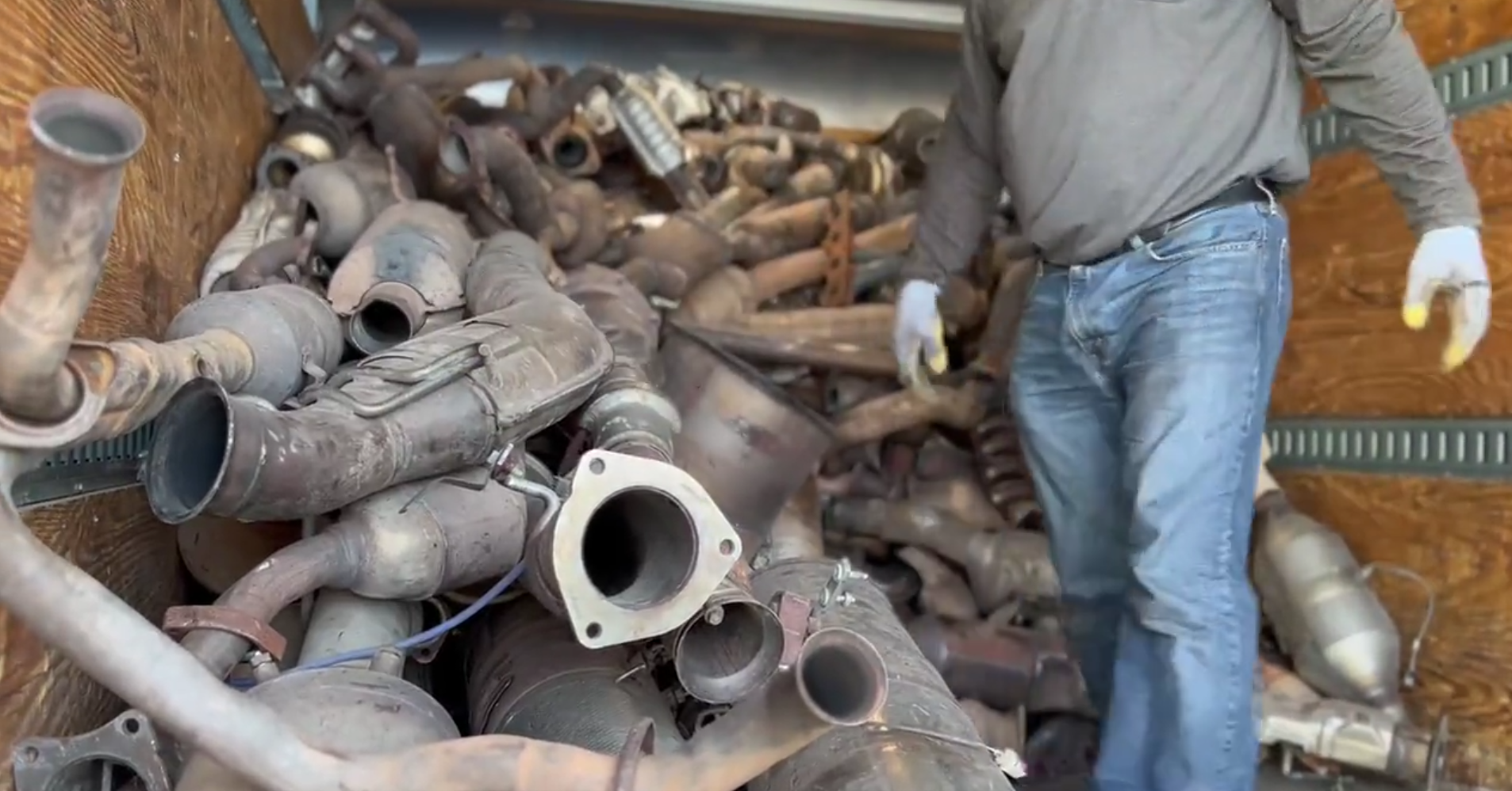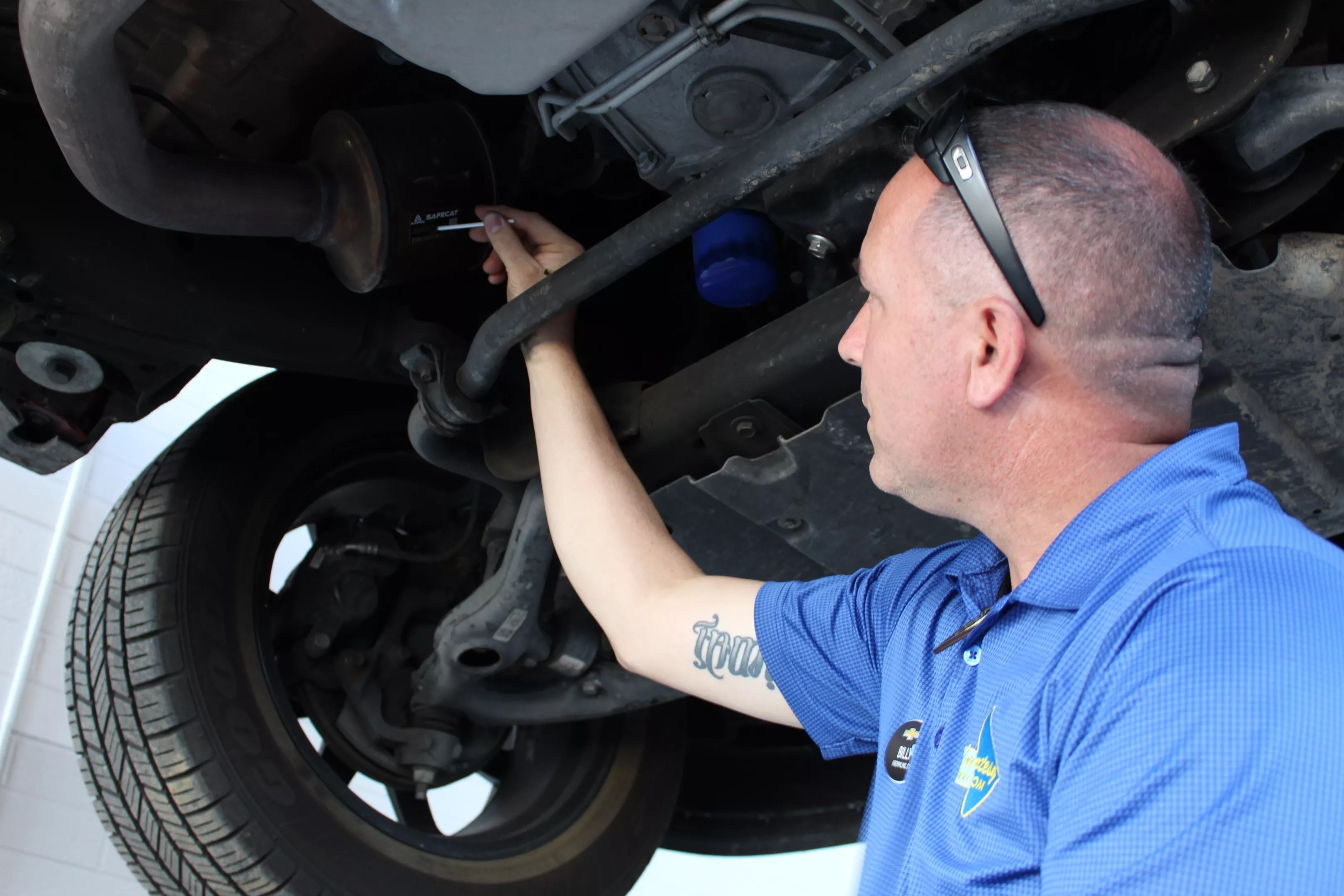
Phoenix Police Department

Audio By Carbonatix
Catalytic converters – those shiny, tubular emission control devices in a vehicle’s exhaust pipe – contain platinum, palladium, and rhodium, three valuable precious metals. Skilled thieves can get their sticky fingers on a catalytic converter in mere seconds and disappear without a trace.
On Thursday, Republicans and Democrats on the Arizona Senate Judiciary Committee agreed by a vote of 6-1 to advance a new bill, SB 1155, that would make catalytic converter theft a Class 6 felony in the state. If convicted, a perpetrator could face up to 18 months in prison and a maximum fine of $150,000.
What lawmakers were told during a hearing before their vote is that catalytic converter thefts aren’t slowing in the state. In 2019, only seven catalytic converters were stolen in Arizona. In 2021, that number jumped to more than 900.
In the last seven months, police departments around Arizona have been inundated with more than 1,000 reports of stolen catalytic converters, according to compiled data from law enforcement. The overwhelming majority of those thefts occurred in metro Phoenix. Arizona continues to be a hot spot for the thefts, according to BeenVerified.
Nationally, the number of reported catalytic converter thefts jumped from 1,300 in 2018 to more than 52,000 in 2021, according to the National Insurance Crime Bureau. Last year, the NCIB republished a Phoenix New Times article about the Phoenix Police Department’s arrest of a man who was connected to an organized theft ring that had been plaguing the city.
But most thefts never see an arrest, let alone a conviction, Maricopa County Deputy Attorney Courtney Sullivan told New Times. Catalytic converters don’t have a serial number or any other identifier tying them to a specific vehicle, so without a mountain of video evidence and eyewitness testimony, prosecutors’ hands are tied. Even then, it’s difficult to get a conviction, and the cases are put on the back burner because they are misdemeanors, Sullivan said.
And despite some innovative new technology in Phoenix that etches identifying strings of numbers onto motorists’ converters, the number of thefts continues to climb.
That’s why lawmakers want to change the existing law and classify catalytic converter theft as a felony.

Billy Blandford applies SafeCat technology to a catalytic converter at Courtesy Chevrolet on Camelback Road.
Elias Weiss
‘It’s a Pretty Easy Bill’
On Thursday, 18 parties, including groups such as the Combined Law Enforcement Association of Arizona, the Arizona Association of Chiefs of Police, and Enterprise Rent-A-Car indicated their support of the new measure.
The bill’s sponsor, Republican state Senator Anthony Kern, was joined by fellow Republican Senators John Kavanagh, Wendy Rogers, and Justine Wadsack, and Democratic Senators Mitzi Epstein and Christine Marsh, in voting to advance the bill to the full Senate.
“It’s a pretty easy bill,” Kern said. “It hasn’t happened to me, but I know a lot of people that it has happened to.”
Democratic Senator Anna Hernandez voted against it, questioning how upgrading the punishment would deter thieves in a historically under-prosecuted crime.
In May 2022, then-Governor Doug Ducey signed a new law that requires every person who buys an aftermarket catalytic converter to submit a record of the sale to the Arizona Department of Public Safety along with a report of any unique identifying markings or numbers on the device.
But Kern said this isn’t enough to curb the ever-worsening “crime epidemic” in Arizona.
“I think that all of us have heard about the significant increase in catalytic converter thefts across the country but more importantly here in the Phoenix metropolitan area,” Kelsey Lundy, the managing partner at Compass Strategies AZ who represents Enterprise, told senators on Thursday. “Enterprise has a significant number of cars throughout the state, and we have seen a significant increase in the last 12 months of catalytic converters being stolen at our locations.”
According to Lundy, Enterprise has 40,000 rental vehicles across Arizona.
Currently, catalytic converter theft is a misdemeanor with a prison sentence of up to six months and $2,500 in fines. Law enforcement is stretched so thin in Phoenix amid staffing shortages that it’s difficult to get an investigation underway even with ample video evidence, Lundy testified.
“Taking the small step of a misdemeanor to a felony will hopefully be a deterrent to those stealing catalytic converters, and also give us an opportunity to have some of those investigated,” Lundy said. “It’s a very good first step.”
Many of the 37 people who indicated that they opposed the bill did so because of concerns about over-policing and prosecutorial overcharging in Phoenix’s low-income neighborhoods.
“Existing laws are sufficient,” said Cave Creek resident Beth Ballmann. “This offense does not warrant a felony charge. This bill will disproportionately affect homeless and addicted people.”
Paradise Valley resident Mary-Jeanne Fincher added that “over-criminalization does not enhance public safety and contributes to the swelling caseloads in the courts and the prison population.”
“It’s bad policy,” she said.
But Kavanagh pointed out that in less egregious cases, a Class 6 felony can easily be downgraded to a Class 1 misdemeanor. It happens all the time in court, he said.
“A Class 6 felony is more in line with the damage done to the actual person,” the Fountain Hills Republican explained. “You’re asking a victim to take a $2,000 hit. It’s reasonable to make this a felony.”